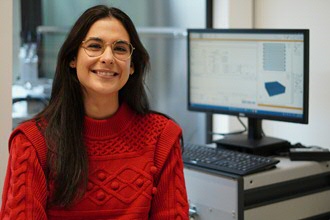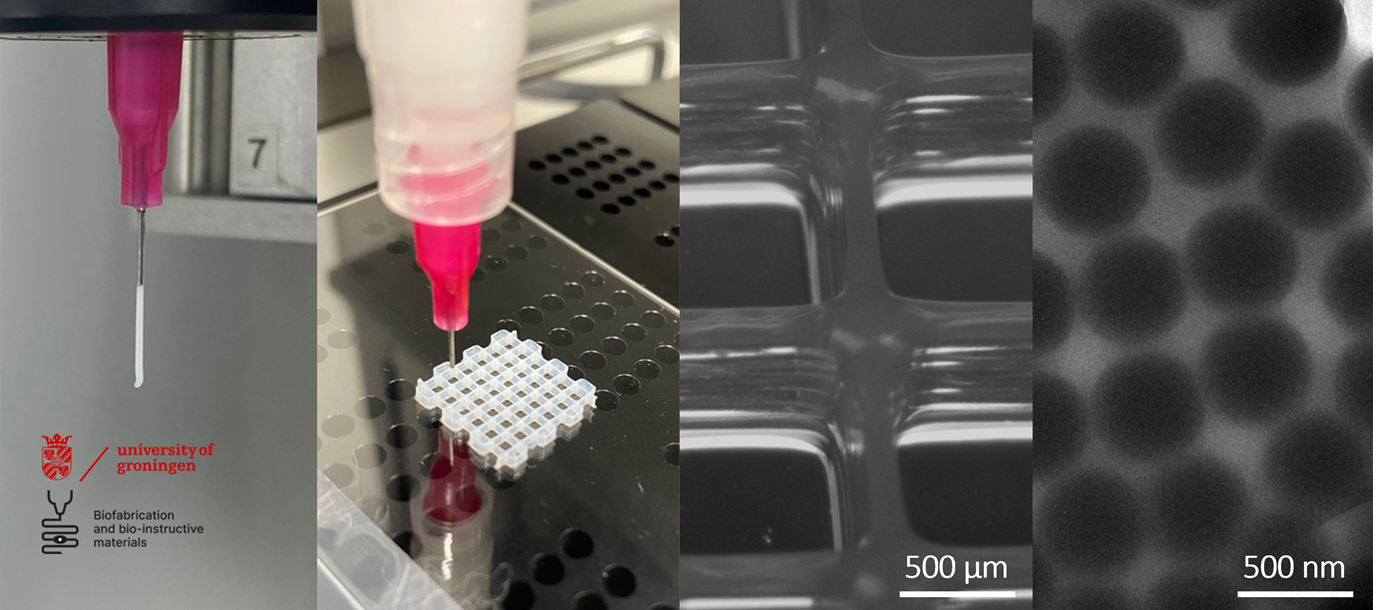Advent calendar - December 21st - Micaela Gaspar Goncalves Fernades
In the Zernike Institute Advent Calendar, we are presenting 24 short spotlights in December. In these specials, we highlight PhD students, postdocs, support staff and technicians of our research groups and team - providing a glimpse in their typical day at work. I n Episode 21 meet Micaela Gaspar Goncalves Fernades, PhD researcher in the Biofabrication and Bio-instructive Materials Group of Gosia Wlodarczyk-Biegun.

I embarked on my PhD journey a year ago by joining Dr. Malgorzata Wlodarczyk-Biegun's Biofabrication and Bio-instructive Materials Group. We focus on employing 3D biofabrication techniques to mimic the native tissues closely. These are highly organized structures, with intricate microarchitecture, biological, chemical, and mechanical properties. Replicating the complex natural environment is essential to succeed in regenerative medicine and tissue engineering. 3D bioprinting is a cutting-edge technique that enables the high-precision fabrication of complex 3D structures that closely resemble natural tissues in terms of morphology, and function.
The formulation of high-performance printable materials, that flow easily from the cartridge onto the printing platform and then solidify immediately maintaining the designed shape and function, is challenging. To address this, my project seeks to establish innovative and straightforward methods for (bio)ink fabrication. I am developing granular hydrogel-based inks for 3D bioprinting of high-shape-fidelity scaffolds. In simple words, instead of printing a bulk hydrogel polymer network, the ink consists of microgel soft particles in a packed/jammed state, very close to each other. This offers advantages compared to bulk hydrogels in terms of porosity, extrudability, and modularity. Notwithstanding their recent emergence, microgel-based systems offer the versatility to print complex, fine-tuned constructs for tissue engineering applications.
My daily activities involve rheological characterization of the biomaterials, and further extrusion, aiming to obtain complex 3D-printed constructs. Committed to fostering a collaborative research environment, I actively engage in working with students and collaborating with colleagues. Especially, with Professor Marleen Kamperman’s group where the atmosphere is a blend of cooperation and friendship. Outside the Lab, I recharge by trying new restaurants in town, cooking, and organizing events to bring the PhD community closer. As part of the GOPHER board, we arrange educational and recreational actions that forge connections between PhD students from different faculties of the University of Groningen.
The best part of the Biofabrication and Bio-instructive Materials research group: the people and their cultural diversity. Members hail from all corners of the world, from the vibrant streets of India to the sunny charm of Portugal, here I am from, stopping in China, Turkey, Iran, and the Netherlands. What I like the most is to learn about their traditions, mindsets, and, of course, delicious cuisines! From the spicy Indian curries and biryanis to the comforting Polish pierogi there's something for every taste bud. On the sweet side, nothing beats a warm Pastel de Nata!
Wishing you a joyous Christmas (full of sweets) and a happy New Year!

| Last modified: | 21 December 2024 09.33 a.m. |
More news
-
24 March 2025
UG 28th in World's Most International Universities 2025 rankings
The University of Groningen has been ranked 28th in the World's Most International Universities 2025 by Times Higher Education. With this, the UG leaves behind institutions such as MIT and Harvard. The 28th place marks an increase of five places: in...
-
05 March 2025
Women in Science
The UG celebrates International Women’s Day with a special photo series: Women in Science.
-
16 December 2024
Jouke de Vries: ‘The University will have to be flexible’
2024 was a festive year for the University of Groningen. In this podcast, Jouke de Vries, the chair of the Executive Board, looks back.
